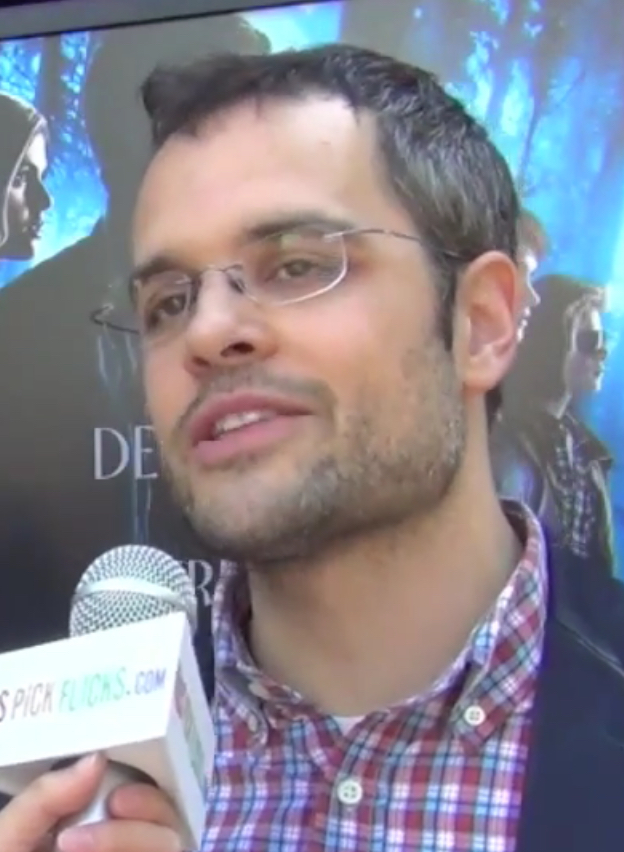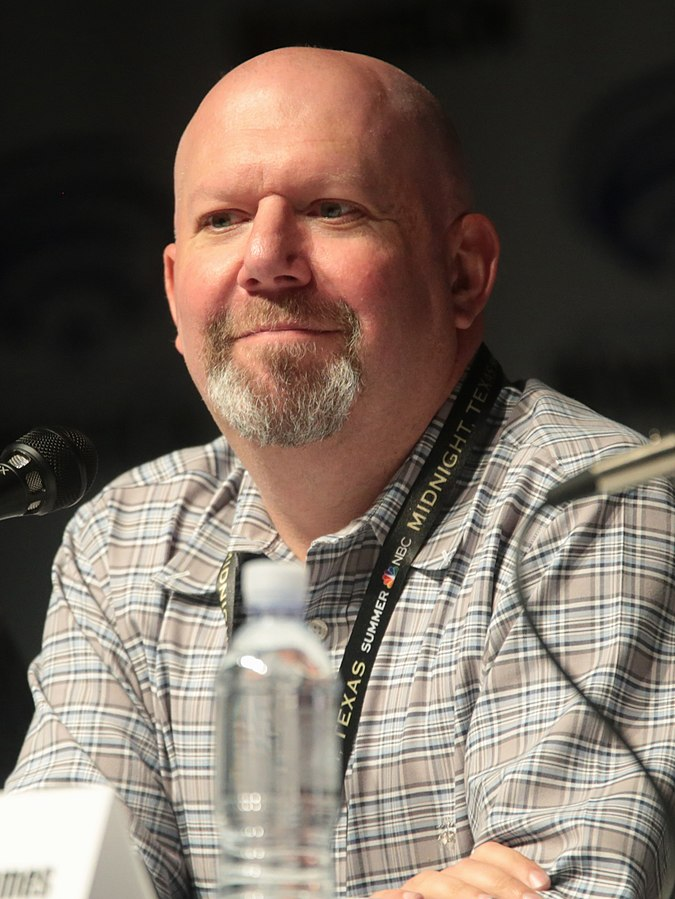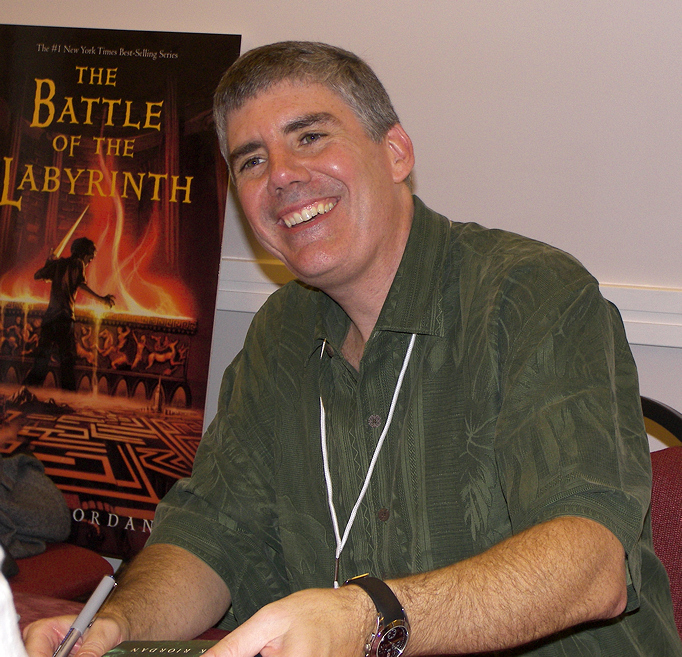Title of the work
Studio / Production Company
Country of the First Edition
Country/countries of popularity
Original Language
First Edition Date
First Edition Details
Percy Jackson: The Sea of Monsters, directed by Thor Freudenthal, Fox 2000, 2013, 106 min.
Running time
Format
Date of the First DVD or VHS
Available Onllne
Trailer (accessed: January 29, 2019)
Genre
Action and adventure fiction
Adaptations
Alternative histories (Fiction)
Fantasy fiction
Magic realist fiction
Motion picture
Mythological fiction
Target Audience
Crossover (Children with parental guidance)
Cover

We are still trying to obtain permission for posting the original cover.
Author of the Entry:
Kimberly MacNeill, University of Roehampton, macneilk@roehampton.ac.uk
Peer-reviewer of the Entry:
Susan Deacy, University of Roehampton, s.deacy@roehampton.ac.uk
Elżbieta Olechowska, University of Warsaw, elzbieta.olechowska@gmail.com

Thor Freudenthal by KidsPickFlicks. Retrieved from Wikimedia Commons, licensed under CC BY 3.0 (accessed: December 22, 2021).
Thor Freudenthal
, b. 1972
(Director)
Freudenthal is a German film maker who began his career working in the art department on films such as Stuart Little (1999). His full length directorial debut was Hotel for Dogs (2009) followed by Diary of a Wimpy Kid (2010). Both centre on young teens who struggle to fit in. With television directorial credits such as The Flash (2014), Arrow (2014-2015), DC’s Legends of Tomorrow (2016–) and Supergirl (2016–) Freudenthal is familiar with dealing with characters with extraordinary secret lives and the interweaving of daily life’s problems and the fantastic.
Bio prepared by Kimberly MacNeill, University of Roehampton, macneilk@roehampton.ac.uk

Marc Guggenheim by Gage Skidmore. Retrieved from Wikimedia Commons, licensed under CC BY-SA 3.0 (accessed: December 22, 2021).
Marc Guggenheim
, b. 1970
(Screenwriter)
Marc Guggenheim started his screenwriting career writing episodes for US television dramas such as The Practice (2001) and Law and Order (2001). He later went on to create the series Eli Stone (2008) and most recently has written for the interweaving DC series Arrow (2012), The Flash (2014–) and DC’s Legends of Tomorrow (2016–) The latter part of his career has focused on ordinary people being exposed to the extraordinary and how they (try) to attain a balance in their lives. Guggenheim initially worked with Freudenthal when he adapted the book Diary of a Wimpy Kid (2010) for its screen debut.
Bio prepared by Kimberly MacNeill, University of Roehampton, macneilk@roehampton.ac.uk

Rick Riordan by Larry D. Moore, 2007. Retrieved from Wikimedia Commons, licensed under CC BY-SA 3.0 (accessed: December 22, 2021).
Rick Riordan
, b. 1964
(Author)
Rick Riordan previously taught History and English at middle school in the American education system. He began writing mystery novels for adult readers before creating the Percy Jackson series, which began as a bedtime story for his son. Prior to Percy Jackson, his adult crime novels the Tres Navarre series received numerous nominations and awards. Most notably the final novel in the series, Rebel Island, won the Anthony Award, Shamus Award and The Edgar Allan Poe Award – the "big three" of the mystery genre. Though it is through the success of Percy Jackson and the Lightning Thief and its subsequent purchase by Disney which has led Riordan to leave teaching to pursue writing as a full-time career. He is now one of the New York Times bestselling authors.
Source:
Q&A with the Author (accessed: January 10, 2018).
Bio prepared by Kimberly MacNeill, University of Roehampton, macneilk@roehampton.ac.uk
Casting
Percy Jackson – Logan Lerman (b. 1992),
Annabeth Chase – Alexandra Daddario (b. 1986),
Tyson – Douglas Smith (b. 1985),
Grover Underwood – Brandon T. Jackson (b. 1984),
Luke Castellen – Jake Abel (b. 1987),
Clarisse – Leven Rambin (b. 1990),
Chiron – Pierce Brosnan (b. 1953),
Poseidon – Kevin McKidd (b. 1973).
Sequels, Prequels and Spin-offs
Percy Jackson and The Olympians: The Lightning Thief (2010, accessed: January 29, 2019).
Summary
The film opens with Percy Jackson providing voiceover to a scene set seven years previously. Four children run through the woods from an unseen threat. Three of the children are revealed to be Luke, Grover and Annabeth. As they approach the boundary to Camp Half-blood the fourth, unnamed, child fights the monsters alone to save the others. She is killed and revealed to be Thalia, daughter of Zeus. In response to her death, Zeus transforms her body into a tree and creates a magical boundary emanating from the tree that protects the inhabitants of the camp from monsters and threats.
Cut to the present and a teenage Percy Jackson is undertaking combat training at Camp Half-blood; his main competitor is Clarisse, daughter of Ares. After an act of compassion leads to Percy conceding victory to Clarisse, he is summoned to the main house at Camp by Mr D (Dionysus) and Chiron. Percy is informed that he has a half brother, Tyson, who is a cyclops. Soon after Tyson’s arrival, the camp is attacked by a Colchian bull, which has managed to penetrate the magical barrier. Several members of the camp are injured with Tyson saving Clarisse when she is unable to subdue it. Percy defeats the bull and Luke, believed to be dead at the end of The Lightning Thief (accessed: January 29, 2019), returns, hinting at a prophecy, before disappearing again. Chiron instructs Percy to visit the Delphic Oracle, a skeletal figure residing in the attic of the main house. The Oracle tells Percy the story of the defeat of Kronos by Zeus, Hades and Poseidon and that a child of the three brothers will either defeat Kronos upon his return or be the destruction of Olympus. As the only known living heir of the big three, it is presumed that Percy is the one named in the prophecy.
During the clean-up from the attack Thalia’s tree is found to have been poisoned and will soon die, leaving the camp unprotected. Annabeth discovers that the Golden Fleece is capable of restoring the tree and that it lies in the Sea of Monsters. Despite initially dismissing Annabeth’s idea, Mr D later announces the idea as his own and sends Clarisse on the quest. Percy, Annabeth and Grover set out on their own quest for the fleece with Tyson tagging along. They travel in the grey witches’ cab, but having insufficient money are dropped off at Capitol Hill where Grover is promptly kidnapped by Luke. The remaining three seek help from Hermes, Luke’s father. Hermes helps them locate Luke and gives them a flask of winds and matter eliminating tape asking in return that Percy try to help Luke see reason when they find him. The three then travel by hippokampai to Luke’s yacht.
Once aboard they are captured by Luke and discover that several campers have joined Luke on his quest, as have several monsters such as the Manticore. Luke reveals his plan to resurrect Kronos using the Golden Fleece. Percy, Annabeth and Tyson use the gifts from Hermes to escape on a lifeboat, but are soon caught in Charybdis who is said to guard the Sea of Monsters. On being swallowed by the monster, they encounter Clarisse onboard an American Civil War ship crewed by zombie Confederate soldiers. By working together, they are able to escape and reach Polyphemus’ island: the location of the fleece. Polyphemus’ cave is located under an abandoned fairground where they discover Grover is being held prisoner, disguising himself as a cyclops maid to avoid being eaten. Using Polyphemus’ blindness they are able to capture the fleece and trap the cyclops in his cave.
The victory is short lived however, as Luke is seen waiting outside with a team of monsters. A struggle ensues which results in Tyson falling to his death into the sea and Luke seizing the fleece. He then uses it to revive Kronos. With Kronos reforming, a rousing speech from Annabeth about forging your own destiny convinces a dejected Percy to fight. He discovers that Riptide can destroy Kronos as it was the blade his father used to destroy the Titan originally. Tyson, revealed to have been healed by the sea, reappears and saves Percy’s life. Luke and Grover are ingested by Kronos, but expelled unharmed after Percy defeats him. However, Luke falls into Polyphemus’ cave below and is assumed to have been eaten by the cyclops. Distracted by their victory over Kronos, Annabeth is mortally wounded by the Manticore before it is slain by Clarisse. The group use the fleece to revive Annabeth and Percy then gives it to Clarisse to return to camp stating it was her quest. Once back at camp the fleece is placed on Thalia’s tree to reverse the effects of the poison. The magical power within the fleece is seen to be much stronger than expected as Thalia appears, alive, trapped in the tree’s roots now a teenager. The film ends with Percy’s musing in the voiceover on the implications to the prophesy, but decides that destiny is there to be made.
Analysis
On the outside, Percy is depicted as fitting in at camp, no longer the "loser" from the first film, but internally he is struggling. The expectations on him, as the son of Poseidon, have failed to turn into victories: he has not participated in any quests since defeating Luke and is beginning to be considered a one-trick pony, not least by himself. His relationship with father has also failed to materialise: Percy has attempted to speak with Poseidon, but has had no response.
To add to his personal doubt is the introduction of his half-brother, the cyclops Tyson. Percy regards this as Poseidon’s attempt to ridicule him after a year of no contact. As the viewer, we see that it is in fact Poseidon’s well meaning response to Percy’s feelings of loneliness. Tyson’s presence is initially a source of embarrassment for Percy. Having lived alone in the wild, Tyson lacks table manners and basic etiquette. This is coupled with the prejudice Tyson faces at campus due to his nature as a cyclops. Even Annabeth is cold and rude towards him, which we learn later is because of her personal experience with cyclops: a group of them killed Thalia. Tyson’s imposing physical presence is contrasted with his childlike naivety and creates a conflict within Percy as he feels both encumbered by his new brother and protective. There is a sense of sibling rivalry on Percy’s part as he initially feels that Poseidon favours Tyson despite his physical appearance.
For Annabeth, the poisoning of Thalia’s tree coupled with the presence of Tyson opens up old wounds as she is forced to revisit the painful episode of her childhood when Thalia was killed. Her fear and hatred of the cyclops as a race informs her approach to Tyson. The scene in which Annabeth sprays Mist into Tyson’s face to give him the appearance of a regular two-eyed teenager invokes an image of an attacker being sprayed with MACE. In this instance, rather than remove a physical threat the Mist removes the emotional threat for Annabeth. In a similar vein to the heroic itinerary, in order to gain acceptance Tyson must carry out a number of tasks to prove both his loyalty and his humanity. His defence of Clarisse against the Colchian bull only creates unease as it is revealed he is impervious to fire. Annabeth’s view of Tyson only becomes free from the prejudice of her past experience when he appears to die to protect Percy. Tyson’s perceived death also changes Percy’s view of the situation and he addresses Tyson simply as "brother" on his return.
The question of loyalties, both misplaced and unexpected, are explored through Luke’s relationship with his father and Kronos and the actions of Clarisse. Luke’s anger stems from his belief that his father Hermes doesn’t care for, and has abandoned, him. This is seen as not the case during the exchange between Hermes and Percy in which the former asks Percy to help Luke see sense. In contrast, when Kronos reforms he promptly devours Luke and bears no thought to the allegiance Luke has displayed towards him. Through these themes, Clarisse‘s character is explored in greater depth. Initially depicted as a rival to Percy they form an alliance in order to escape Charybdis and defeat Polyphemus. Her initial dismissal as purely a warrior as a child is challenged when she is seen to be knowledgeable about the story of Odysseus and his encounter with Polyphemus.
Furthermore, Clarisse’s lack of compassion for other half-bloods in the opening of the film, considered a trait of a child of Ares, is changed in the final battle as she risks her own life in order to help Annabeth kill the Manticore and is visibly distressed when Annabeth is mortally wounded. She acts on her own instincts rather than trying to live up to the expectations of her father. Her reward is to return to camp victorious with the fleece, also showing that Percy is no longer concerned with people’s outward view of him. The balance of enemy and sometime uneasy ally is reminiscent of the dynamic between D’Artagnan and Rochefort in Dumas’ d'Artagnan Romances (1843-1847) and serves the same function to show the development of maturity of the hero.
Grover fulfils the role of comic foil in his disguise as a cyclops maid in order to avoid being eaten. His trickery of Polyphemus is reminiscent of Odysseus’ original trick on Polyphemus, and as a twist, the heroes use the rock the cyclops used to trap Odysseus to trap him.
Destiny features high on the agenda. It is a preoccupation of both Percy and Luke. For Percy, the Delphic Oracle’s prophesy that a child of the Big Three will either save or destroy Olympus looms over him. From being the only known living child at the beginning of the film and worrying his own ineptitude will destroy Olympus, to contemplating Tyson in the prophecy to the final emergence of Thalia, Percy is concerned with his place in the world. Only in his final defeat of Kronos does he decide that destiny and his role are not important only the end results count. Luke considers himself destined to free the Titan Kronos and be remembered for doing so.
Further Reading
Paul, J., "The Half-Blood Hero: Percy Jackson and Mythmaking in the Twenty-First Century" in H. Hoyle and V. Zajko, eds., A Handbook to the Reception of Classical Mythology (Wiley-Blackwell 2017), 231–242.
Riordan, R., Percy Jackson and the Sea of Monsters (2006, accessed: January 29, 2019).
Roisman, H., “The Odyssey from Homer to NBC: The Cyclops and the Gods” in L. Hardwick and C. Stray, eds., A companion to classical receptions. A Companion to Classical Receptions, Wiley-Blackwell, 2011, 315–325.
Addenda
Translations: Subtitles region 2 dvd: English (hearing impaired), Danish, Finnish, Norwegian, Swedish.


